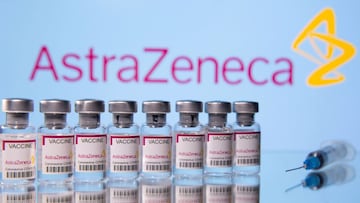What is the rate of blood clots for each covid-19 vaccine?
Concerns over blood clots have made many in the US more hesitant to get a shot, but how common are clots for each vaccine available? Our team took a look.


Less than one percent of those who have received a covid-19 vaccine in the US have developed blood clots as a consequence. Although the possibility of adverse events has been reported widely by the media, the actual risk remains very low. An individual is much more likely to suffer from severe, lasting, and even fatal outcomes by contracting covid-19 compared to receiving a vaccine dose.
More than 100 million adults in the United States have been fully vaccinated against #COVID19 and are resuming activities they did before the pandemic. COVID-19 vaccines are safe and effective. Get vaccinated as soon as you can. More: https://t.co/yJFqxDIlhb. pic.twitter.com/eYYUR6Tpkq
— CDC (@CDCgov) June 9, 2021
Astra Zeneca
The covid-19 vaccine developed by Oxford University and AstraZeneca has yet to be approved in the US. Several countries, including Denmark, that had approved its use, discontinued it after some residents developed life-threatening blood clots. The US health authorities tasked with vaccine approval, the FDA and the CDC, have resisted until more data on possible adverse events were collected and analyzed.
However, a new study published in Nature Medicine this week highlights that vaccine-associated thrombocytopenia and vascular adverse events are exceedingly rare in those who receive the AstraZeneca vaccine. The research team was able to build a database that included “individual patient-level data relating to vaccination status,” adverse reactions, and mortality information for nearly 99% of the Scottish population.
Using this data, they found that of all the types of blots included in the analysis, only one -- idiopathic thrombocytopenic purpura -- had a statistically significant relationship with the vaccine. Nearly 1.7 million Scots have been vaccinated with AstraZeneca’s vaccine, and only 142 experienced a vaccine-related clot. The experts estimate that the risk of this clot forming is just over 1 in every 100,000 people vaccinated.
People receiving the Oxford-AstraZeneca Covid vaccine had a slightly increased risk of a bleeding disorder, and possibly other rare blood problems as well, researchers reported after studying 2.53 million adults in Scotland. https://t.co/4TZKEy8Fuh
— The New York Times (@nytimes) June 9, 2021
In light of this data, some governments may move to approve or continue using the AstraZeneca vaccine. Compared to Pfizer and BioNTech, this vaccine may help to increase the global vaccine rollout as the logistics of getting the doses into arms are not as complicated since it do not need to be kept at such extreme temperatures.
Johnson and Johnson
On 13 April, the CDC announced the pause in rollout of Johnson and Johnson’s (J&J) vaccine after several cases of a rare blood clot -- cerebral venous sinus thrombosis -- were reported.
In total, of the more than eight million people pricked with the single-shot vaccine in March and April, seventeen cases of blood clots were found. All were picked up through the CDC’s vaccine safety monitoring system. On 28 April, the pause was lifted as experts concluded that the benefits of deploying the vaccine outweighed the risk. However, before the decision was made, the CDC stated that they had “conducted extensive outreach to providers and clinicians to ensure they were made aware of the potential for these adverse events and could properly manage and recognize these events.”
Additionally, further research released by the CDC in May, concluded that “97% of reported reactions after vaccine receipt were nonserious, consistent with preauthorization clinical trials data."
Moderna and Pfizer & BioNTech
Related stories
As of 23 April, the CDC has stated that there have been no reports of blood clots resulting from vaccination with Moderna or Pfizer’s vaccine. The Nature study also analyzed rates of clots from the Pfizer vaccine and found no connection with any type of clot, confirming the CDC's findings.
Safety monitoring continues
As millions across the US receive their shots each day, the CDC continues to monitor the safety of the vaccines. Since the beginning of the roll-out, the health agency has assured the public that ensuring that the vaccines are safe is their top priority. The organization has highlighted the quick capture of adverse events reported after some received the J&J vaccine as evidence that the monitoring system used to track potentially fatal side effects was working.

